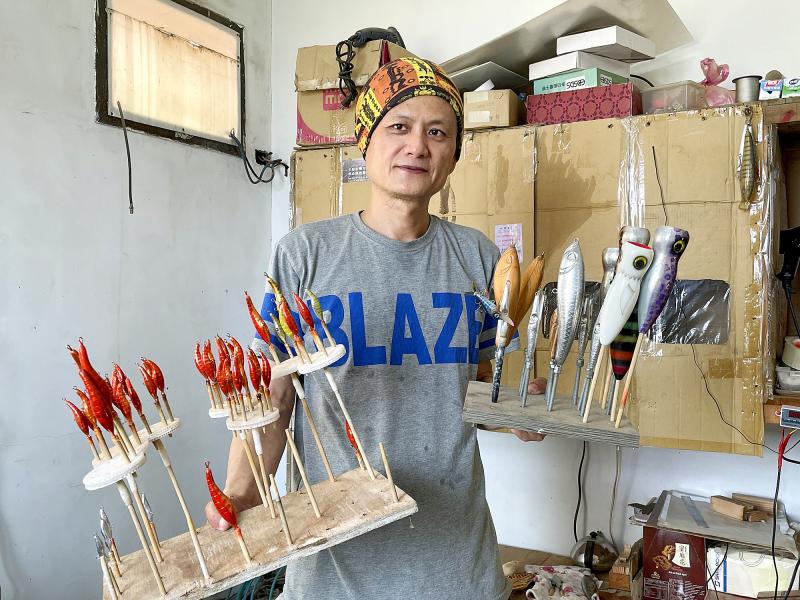A man in Kinmen County who left his job in construction due to a chronic illness has found a new calling making eco-friendly fishing lures.
Wang Tsung-lieh (王聰烈) said that his love of fishing motivated him to make lures for a living, adding that he makes them only with wood to prevent damage to the marine environment.
The pandemic has caused a dent in sales, but he is still working hard at making the fishing tackle, he said.

Photo: CNA
Wang was introduced to lure fishing by a senior classmate when he was 17, and later taught himself to make lures, he said.
“Lures do just as their name suggests — they lure fish in by mimicking smaller fish. Lures can move differently in the water depending on how you manipulate the fishing line,” he said.
Asked how he ended up in Kinmen, Wang said that his mother and two brothers moved to the county 20 years ago to work in construction.
After his mother and older brother later passed away in Kinmen he made the trip for the funeral, he said.
While there, he felt that his fate was to live in Kinmen, so he relocated to the county, he said.
However, after his muscle atrophy worsened he was unable to continue doing construction work, and decided instead to follow his interest making lures, he said.
“I had graduated from a vocational high school and was good at working with machine tools, so for me, making lures was not difficult,” he said.
Wang said that while making lures by hand could be considered an artisan craft, a knowledge of fluid mechanics is necessary to make the lures move well in water.
Wang said that his lures move vertically and horizontally, in a natural way that mimics the movement of real fish and are not affected by waves.
The lures take one to two weeks to make, and cost between NT$280 and NT$4,000, depending on the level of their complexity, he said, adding that his lures are priced higher compared with those sold on the market, which are made of plastic and mass produced.
“Unfortunately, most of those plastic lures break from the line and end up as marine waste,” he said.
Well-crafted lures also have the benefit of being a collectible item for fishers, he said.
“Fishing enthusiasts have the habit of taking photos of their catches. If the lure is visible in the shot, it’s not uncommon for other enthusiasts who see the photo to buy the lure from the person who made the catch,” he said.
However, despite the collectability and practical nature of lures, the relatively small number of fishing enthusiasts in Taiwan means that he has a small market to pitch his wares to, he said, adding that the pandemic has made sales even more challenging.
“But I’m not giving up. I hope in the future I can add some local Kinmen element to my lures to make them even more unique,” he said. “I want to forge ahead on this island.”

Nipah virus infection is to be officially listed as a category 5 notifiable infectious disease in Taiwan in March, while clinical treatment guidelines are being formulated, the Centers for Disease Control (CDC) said yesterday. With Nipah infections being reported in other countries and considering its relatively high fatality rate, the centers on Jan. 16 announced that it would be listed as a notifiable infectious disease to bolster the nation’s systematic early warning system and increase public awareness, the CDC said. Bangladesh reported four fatal cases last year in separate districts, with three linked to raw date palm sap consumption, CDC Epidemic Intelligence

The manufacture of the remaining 28 M1A2T Abrams tanks Taiwan purchased from the US has recently been completed, and they are expected to be delivered within the next one to two months, a source said yesterday. The Ministry of National Defense is arranging cargo ships to transport the tanks to Taiwan as soon as possible, said the source, who is familiar with the matter. The estimated arrival time ranges from late this month to early next month, the source said. The 28 Abrams tanks make up the third and final batch of a total of 108 tanks, valued at about NT$40.5 billion

Two Taiwanese prosecutors were questioned by Chinese security personnel at their hotel during a trip to China’s Henan Province this month, the Mainland Affairs Council (MAC) said yesterday. The officers had personal information on the prosecutors, including “when they were assigned to their posts, their work locations and job titles,” MAC Deputy Minister and spokesman Liang Wen-chieh (梁文傑) said. On top of asking about their agencies and positions, the officers also questioned the prosecutors about the Cross-Strait Joint Crime-Fighting and Judicial Mutual Assistance Agreement, a pact that serves as the framework for Taiwan-China cooperation on combating crime and providing judicial assistance, Liang

Reports of Taiwanese going missing, being detained or interrogated, or having their personal liberties restricted in China increased about fourfold annually last year, the Mainland Affairs Council (MAC) said yesterday. Last year, 221 Taiwanese who traveled to China were reported missing, were detained and interrogated, or otherwise had their personal freedom restricted, up from 55 the previous year, the council said. Reopening group tours to China would be risky, as it would leave travelers with no way to seek help through official channels after Beijing shut down dialogue between the associations tasked with handling cross-strait tourism, the MAC said. Taipei’s Taiwan Strait Tourism